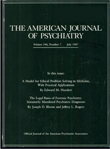Dr. Sobin Replies
TO THE EDITOR: Indeed, the ambiguous application of the terms “agitation” and “retardation” was a primary impetus for the preparation of our article. At various times the terms have been used in the literature, and in our diagnostic criteria, to indicate any internal or external manifestation of slowness or restlessness during an episode of depression. Perhaps as a result, the likely source of these phenomena, and thus their meaning and significance, has been obscured. We intentionally focused this article on studies of objectively quantifiable aspects of motor change in depression. Using this approach, we examined evidence suggesting links between these observable motor symptoms and the possible pathophysiological basis of some depressions. Understanding the subjective experience of slowness or agitation is important for different reasons, most significantly for patient care. The findings of Dr. Lemke and associates suggest that the association between the subjective experience and objective assessment of agitation and retardation is complex, and a positive correlation should not be assumed. This will be a useful and intriguing area for further investigation.
Unfortunately, space constraints limited our discussion of the interesting and significant work conducted by Parker et al. (1). Parker and colleagues initiated a series of studies in the mid-1980s that were intended to redefine melancholic depression and thereby identify a “preferential” neurobiologically-based subtype. At the time, the extant criteria for melancholia were inadequate to define a homogeneous subgroup of patients and seemed little more than an index of depression severity. One of the results of this endeavor was the CORE. Although “sign-based,” the CORE intermixes motor and nonmotor aspects of agitation and retardation. Six of the 18 items assess manifestations of “noninteractiveness” that have no established relationship with motor functioning. For studies of motor change in depression, a positive CORE score composed of ratings on only these items would be difficult to interpret. In addition, the CORE does not include several aspects of observable motor changes that have been reported in the empirical literature to be associated with agitation and retardation in depression. Thus, while the CORE has demonstrated research value, it may not be optimal for studies intending to assess the motor abnormalities of depression. Another alternative, the Motor Agitation and Retardation Rating Scale (MARS) was developed to provide a comprehensive and nonredundant measure of the observable motor abnormalities associated with agitation and retardation in depression. Studies to date suggest that the MARS is a reliable and valid scale for the clinical assessment of 19 abnormal motor behaviors associated with depression (2), and that it could be used in combination with instruments such as the CORE to assess the relation between objective and subjective manifestations of agitation and retardation in depression. Whether these instruments will be useful for the investigation of the pathophysiological significance of motor abnormalities in depression awaits substantiation.
1 Parker G, Hadzi-Pavlovic D (eds): Melancholia: A Disorder of Movement and Mood. New York, Cambridge University Press, 1996Google Scholar
2 Sobin C, Mayer L, Endicott J: The Motor Agitation and Retardation Scale: a scale for the assessment of motor abnormalities in depressed patients. J Neuropsychiatry Clin Neurosci (in press)Google Scholar



